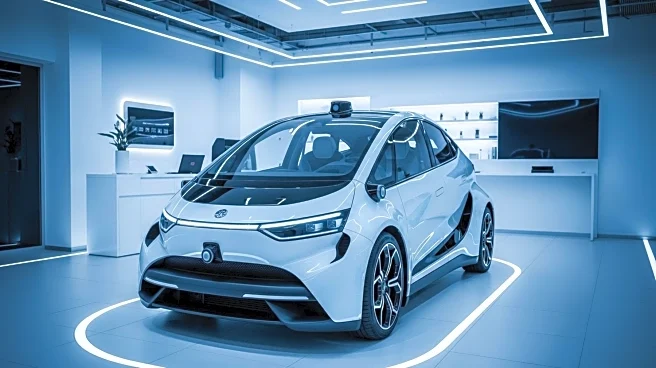What's Happening?
Tensor, a startup based in San Jose, has announced the launch of what it claims to be the world's first fully autonomous vehicle available for personal ownership. The vehicle, named 'Robocar,' is equipped with an SAE Level 4 driving system, allowing it to operate without human supervision within designated operational design domains (ODDs). These ODDs are geofenced areas similar to those used by robotaxis like Waymo. The car is designed to function autonomously, with features such as a retractable steering wheel and pedals when in Level 4 mode. Tensor plans to release the Robocar in the UAE in 2026, followed by Europe and the U.S. in 2027. The vehicle is heavily equipped with sensors, including cameras, lidars, radars, microphones, and ultrasonic sensors, all powered by Nvidia GPUs capable of processing 8,000 trillion operations per second.
Why It's Important?
The introduction of Tensor's Robocar marks a significant milestone in the automotive industry, potentially transforming personal transportation by eliminating the need for human supervision. This development could lead to increased safety and convenience for consumers, as the vehicle can autonomously handle tasks such as driving to a mechanic for service. However, the rollout of such technology faces challenges, including navigating a complex regulatory landscape in the U.S., where autonomous vehicle laws vary by state. Additionally, consumer acceptance of fully autonomous vehicles remains uncertain, with mixed attitudes towards the technology. Tensor's approach, which emphasizes privacy by not collecting driver data without permission, may appeal to consumers concerned about data security.
What's Next?
As Tensor prepares for the Robocar's release, the company will need to address regulatory hurdles and consumer skepticism. The establishment of geofenced areas for autonomous operation will be crucial, and Tensor may need to collaborate with local governments to define these zones. The company will also have to ensure the vehicle's safety and reliability to gain consumer trust. As the Robocar enters the market, it could prompt other automakers to accelerate their own autonomous vehicle development, potentially leading to increased competition and innovation in the industry.
Beyond the Headlines
The launch of Tensor's Robocar could have broader implications for urban planning and infrastructure, as cities may need to adapt to accommodate autonomous vehicles. This shift could lead to changes in traffic management, parking, and public transportation systems. Additionally, the technology raises ethical and legal questions regarding liability in the event of accidents, which will need to be addressed as autonomous vehicles become more prevalent.










